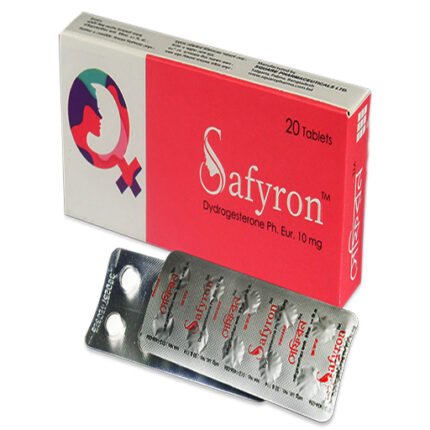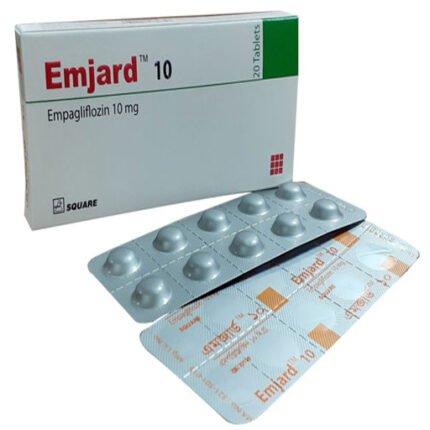Emjard 25
400.00৳ Strip
- Emjard is a medication for adults with type 2 diabetes mellitus.
- It improves glycemic control when combined with diet and exercise.
- By inhibiting sodium glucose co-transporter-2 (SGLT-2) in the kidneys:
- Increases glucose excretion
- Promotes weight loss
- Reduces blood pressure
- Emjard is available in tablet form for once-daily administration, with or without food.
- Patients should follow recommended dosages and consult healthcare professionals for optimal diabetes management.
 Brand
Brand
|
Square Pharmaceuticals PLC |
|---|---|
 Generics
Generics
|
Empagliflozin |
Indications:
Emjard is indicated as an adjunct to diet and exercise to improve glycemic control in adults diagnosed with type 2 diabetes mellitus. It is also prescribed to reduce the risk of cardiovascular death in adult patients with type 2 diabetes mellitus and established cardiovascular disease.
Pharmacology:
Empagliflozin, a key component of Emjard, acts as a sodium glucose co-transporter-2 (SGLT-2) inhibitor. SGLT2 co-transporters facilitate the reabsorption of glucose from the glomerular filtrate in the kidney. By inhibiting SGLT2, Emjard enhances glucuretic effects, reducing renal glucose absorption and consequently lowering the renal glucose threshold. This mechanism leads to increased glucose excretion, reduced hyperglycemia, weight loss, and lowered blood pressure.
Dosage & Administration:
The recommended dose of Empagliflozin in Emjard is 10 mg once daily, preferably taken in the morning with or without food. Patients tolerating Empagliflozin may have their dose increased to 25 mg once daily. It is advised to correct any volume depletion before initiating Empagliflozin therapy.
Interaction:
When co-administered with diuretics, Emjard may lead to increased urine volume. Combining Emjard with insulin or insulin secretagogues increases the risk of hypoglycemia. Monitoring glycemic control through urine glucose tests is not recommended due to SGLT2 inhibitors’ effect on urinary glucose excretion. Similarly, relying on 1,5-anhydroglucitol (1,5-AG) assay for assessing glycemic control in patients taking SGLT2 inhibitors is discouraged.
Contraindications:
Empagliflozin within Emjard is contraindicated in patients with a history of serious hypersensitivity reactions to Empagliflozin or its components, severe renal impairment, end-stage renal disease, or undergoing dialysis.
Side Effects:
Common adverse reactions associated with Emjard include urinary tract infections and female genital mycotic infections. Other common side effects include dehydration, hypotension, weakness, dizziness, and increased thirst.
Pregnancy & Lactation:
There are no adequate and well-controlled studies of Empagliflozin in pregnant women. Empagliflozin should only be used during pregnancy if the potential benefit justifies the potential risk to the fetus. It is unknown whether Empagliflozin is excreted in human milk; thus, its use is not recommended during breastfeeding.
Precautions & Warnings:
Assessment of renal function is recommended before initiating Emjard therapy and periodically thereafter. Emjard should not be initiated in patients with an estimated glomerular filtration rate (eGFR) less than 45 ml/min/1.73 m^2. No dose adjustment is necessary for patients with an eGFR greater than or equal to 45 ml/min/1.73 m^2.
Overdose Effects:
In cases of Emjard overdose, standard supportive measures should be employed, including the removal of unabsorbed material from the gastrointestinal tract, clinical monitoring, and supportive treatment. The efficacy of hemodialysis for Emjard removal has not been studied.
Therapeutic Class:
Emjard belongs to the therapeutic class of Sodium-glucose Cotransporter-2 (SGLT2) Inhibitors.
Storage Conditions:
Emjard should be kept in a cool and dry place (below 30°C), protected from light and moisture, and out of reach of children.
Chemical Structure:
Molecular Formula: C23H27ClO7 Chemical Structure: Empagliflozin’s chemical structure is characterized by its molecular formula.
Common Questions about Emjard 25 mg Tablet:
- What is Emjard 25 mg Tablet? Emjard 25 mg Tablet is an SGLT-2 inhibitor that reduces glucose reabsorption in the kidneys.
- What is Emjard 25 mg Tablet used for? Emjard 25 mg Tablet is primarily used to improve glycemic control in adults.
- Are there any pregnancy warnings? Emjard 25 mg Tablet should be used cautiously during pregnancy.
- Are there any breastfeeding warnings? Emjard 25 mg Tablet is likely unsafe for breastfeeding.
- Does this affect kidney function? Emjard 25 mg Tablet should be used cautiously in individuals with underlying kidney conditions.
- Does this affect liver function? No dose adjustment is necessary for patients with mild to moderate liver impairment.
Quick Tips:
- Emjard 25 mg Tablet is used alone or in combination with other antidiabetic medications to regulate blood sugar levels and prevent long-term complications.
- Emjard 25 mg Tablet may cause dehydration or increased urinary frequency; adequate hydration is recommended.
- Hypoglycemia may occur when Emjard 25 mg Tablet is used with other antidiabetic agents, alcohol, or in cases of delayed or missed meals. Carrying a source of sugar for prompt alleviation of hypoglycemia symptoms is advised.
- Both males and females may experience genital fungal and/or urinary tract infections (UTIs) with Emjard 25 mg Tablet; practicing good hygiene is essential.
- Regular monitoring of blood sugar levels is recommended during Emjard 25 mg Tablet therapy.
- Prompt medical attention is necessary if persistent dizziness, joint pain, cold-like symptoms, or unexplained nausea/vomiting occur while taking Emjard 25 mg Tablet.













Reviews
There are no reviews yet.